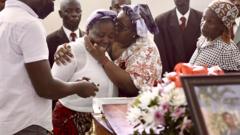**In the wake of escalating protests against election results in Mozambique, children have become victims of police violence, igniting nationwide outrage and grief.**
**Mozambique Mourns as Children Fall Victim to Police Violence in Protests**

**Mozambique Mourns as Children Fall Victim to Police Violence in Protests**
**Tragic deaths highlight political tension following disputed presidential election**
In Mozambique’s capital, Maputo, a somber atmosphere enveloped a cemetery as mourners—predominantly children—paid their last respects to 16-year-old Antonio Juaqim, who was fatally shot during a pot-banging protest. The gathering was not just for Antonio; it represented a collective mourning for the youth caught in the turmoil of a country faced with a deeply controversial political landscape.
Antonio's uncle, Manuel Samuel, revealed grim details about his nephew's death, saying he was shot in the mouth and the bullet exited through the back of his head. This tragedy occurred amidst widespread discontent following the recent presidential election, in which Frelimo, the long-ruling party, claimed a landslide victory with 71% of the votes. The opposition, led by former Renamo member Venâncio Mondlane, disputed this result, alleging it was marred by fraud.
Since the announcement of the election results, nightly protests have erupted as citizens respond to Mondlane's call to reject what they consider an extension of Frelimo's nearly five-decade rule. Witnesses recounted how the protests commenced with hope but quickly devolved into violence, resulting in several casualties—including Antonio. According to reports from human rights groups, at least 40 people, including ten children, have died due to police actions linked to the protests.
During Antonio's funeral, a poignant eulogy highlighted the reality of young lives lost in the struggle for a better Mozambique. His friends, mourning alongside family members, planted flowers and released balloons, signifying the dreams and hopes extinguished by gun violence.
Mozambique's police chief, Bernadino Raphael, has publicly expressed condolences to victims' families but placed the blame on Mondlane’s supporters, alleging they had incited violence and used children as shields during clashes. Critics, however, including Albino Forquilha of the Optimist Party, argue that the police response has been excessively harsh, further escalating tensions in an already polarized environment.
Analysts note that this wave of protests marks a significant shift in the political landscape of Mozambique, particularly among the youth who feel disillusioned with the current leadership. They are demanding economic opportunities and voicing their frustration over a lack of progress—demanding a form of independence that extends beyond political freedoms.
As tensions rise, Mondlane's supporters have continued their calls for justice, signaling a critical point in Mozambique’s recent history—a time when dreams of a youthful populace clash with entrenched political power.
Antonio's uncle, Manuel Samuel, revealed grim details about his nephew's death, saying he was shot in the mouth and the bullet exited through the back of his head. This tragedy occurred amidst widespread discontent following the recent presidential election, in which Frelimo, the long-ruling party, claimed a landslide victory with 71% of the votes. The opposition, led by former Renamo member Venâncio Mondlane, disputed this result, alleging it was marred by fraud.
Since the announcement of the election results, nightly protests have erupted as citizens respond to Mondlane's call to reject what they consider an extension of Frelimo's nearly five-decade rule. Witnesses recounted how the protests commenced with hope but quickly devolved into violence, resulting in several casualties—including Antonio. According to reports from human rights groups, at least 40 people, including ten children, have died due to police actions linked to the protests.
During Antonio's funeral, a poignant eulogy highlighted the reality of young lives lost in the struggle for a better Mozambique. His friends, mourning alongside family members, planted flowers and released balloons, signifying the dreams and hopes extinguished by gun violence.
Mozambique's police chief, Bernadino Raphael, has publicly expressed condolences to victims' families but placed the blame on Mondlane’s supporters, alleging they had incited violence and used children as shields during clashes. Critics, however, including Albino Forquilha of the Optimist Party, argue that the police response has been excessively harsh, further escalating tensions in an already polarized environment.
Analysts note that this wave of protests marks a significant shift in the political landscape of Mozambique, particularly among the youth who feel disillusioned with the current leadership. They are demanding economic opportunities and voicing their frustration over a lack of progress—demanding a form of independence that extends beyond political freedoms.
As tensions rise, Mondlane's supporters have continued their calls for justice, signaling a critical point in Mozambique’s recent history—a time when dreams of a youthful populace clash with entrenched political power.

















